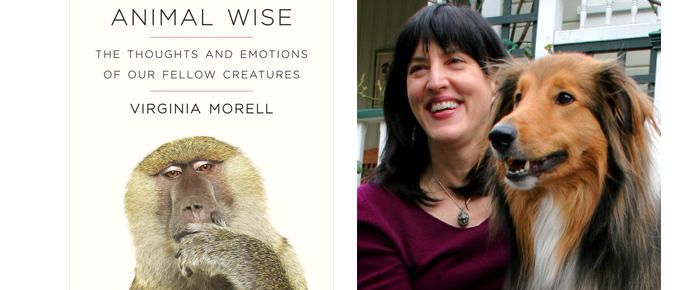
By Heidi Simmons
—–
Animal Wise: The Thoughts and Emotions of Our Fellow Creatures
By Virginia Morell
Non-Fiction
—–
There is a reason the CVW “Pet Place” column by Janet McAfee is so popular. People love their animals. Pet owners know that whether dog, cat, bird, fish, rat, snake or whatever living thing you may care for, it is not merely an “animal.” It is a conscious, thinking, living being that we as humans relate to in more ways then just feeding. In Virginia Morell’s, Animal Wise: The Thoughts and Emotions of Our Fellow Creatures (Crown Publishing, 304 pages) she looks at the scientific evidence that proves our fellow creatures with whom we share this amazing planet are indeed intelligent and emotional.
To those of us who have been blessed to have relationships with animals, this may seem obvious. There is no doubt that our beloved pets are smart and have feelings. Observe the wild critters that come into your yard and you know they’re not mindless as well. But for the scientific community, it has been a challenge to accept that animals can make complex, cognitive decisions, or have genuine emotions.
For one, there has always been the fear of anthropomorphism — attributing human thoughts and feelings to animals — that has made studying animal behavior complicated. How, as humans, can we objectively interpret, let alone prove that a rat is happy, an elephant grieves or a bird is joyful? These are human qualities.
Another hindrance in the advancement of understanding animal thinking is because psychologists rather than biologists have dominated the field of cognitive behavior. Since Darwin, science had looked at animals as only evolutionary stepping-stones, unworthy and unnecessary in the advancement of our human nature and experience.
Morell even intimates that keeping animals “stupid” and incapable of feeling may be beneficial to the food industry. The more we know about animal’s intelligence, the less likely we may be to eat or experiment on them.
But the scientific community has finally taking note. Over the last decade and a half, author Morell shows us the significant work that has been done that proves animals, as well as insects, are neurologically equipped to communicate effectively, make decisions and experience emotions. She includes impressive experiments by scientists all around the globe that reveal cognition and sentience is intertwined in animals.
The book begins with ants. The ant brain has a hundred thousand neurons, pretty impressive when you consider their miniscule size — humans have a hundred billion. Ants are able to function without leadership and teach new generations all they need to know to keep their complex society functioning effectively.
Experiments with fish and birds show their remarkable ability to consider their environment, adjust their thinking and make decisions. Morell includes research on rats, elephants, dolphin, chimpanzees, which all have amazing abilities, intelligence and emotions. In addition, they each have sophisticated forms of communication.
Dogs and wolves are also included in Animal Wise. Morell points out that Darwin was a dog person. Owning many dogs, he believed dogs had the power to reason, feel love, jealousy, pride and had a conscience. But his observations were anecdotal and not accepted by the scientific community.
Besides Pavlov and a few others, cognition research on dogs was not taken seriously because humans shaped dog behavior. Fortunately, that has changed over the last few decades, and although it is true dogs resemble the minds of their humans, dog studies are now accepted and have helped us learn about our own minds.
Recent studies show that dogs prefer to be with humans almost from the moment they open their eyes. Given a choice, a dog would choose a human companion over another dog. Researchers now agree that dogs and humans share numerous behaviors and traits and share a desire to work together to accomplish a task.
Results from animal behavior experiments have begun to shape and improve laws regarding the humane treatment and protection of animals. However, the scientific community still argues over the definition of animal when it comes to mice, rats, fish and birds. Not surprising considering these creatures are the most popular in laboratory experimentation.
All animals possess valuable wisdom from which we humans can learn. We can be enlightened by their sensitivity, experience and knowledge. We are all related and share the same planet. Wildlife and domestic animal are an integral part of our existence and humans need to be far more respectful, thoughtful and considerate of their place and contribution.
At times this book just blows one’s mind. What creatures know, think and feel is intense, moving and beautiful. It may be that all living things — even plants(?) — are conscience beings. Author Morell is a science writer and an animal lover. She does a great job bringing the experiments to life and describing the various attributes the creatures display. Morell puts the reader right in the lab and field with the animals.
In Animal Wise, Morell is not asking how we are different from the animals, but how are we alike. We are just at the beginning of understanding our fellow creatures and there is so much more to learn. Animals have been on the planet longer than we have. Maybe it’s time to tune in, listen and value their contribution while we still can. It is exciting to think about all we can learn and all we don’t know.








































